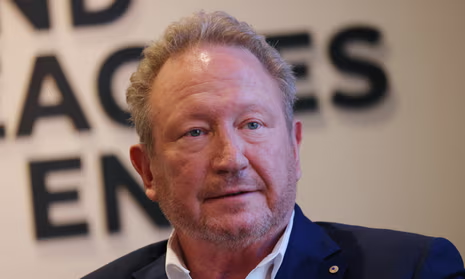Andrew Forrest, the mining magnate has warned that the federal Coalition’s proposed abandonment of the 2030 emissions reduction target would hit Australian exports with penalty carbon taxes.
The Fortescue boss warned on Tuesday that relying on the introduction of nuclear power in at least 15 years’ time while opposing large-scale renewables and abandoning interim targets would cripple investment certainty.
Scrutiny of the Coalition’s climate policy is increasing after CSIRO said electricity from nuclear energy would be at least 50% more expensive than solar and wind and Peter Dutton’s plan to oppose the 43% emissions reduction by 2030 was exposed as an abandonment of the Paris agreement.
Recall that on Monday the Nationals leader, David Littleproud, said that Australia did not need “large-scale industrial windfarms” such as those proposed for an offshore zone south of Sydney, adding that the Coalition would “cap” investment in renewable energy if elected.
Forrest said investors needed “certainty of what government policies are”.
Read also: Report finds almost 2,000 children die every day from air pollution
“If we flip-flop between policies, if we go back to the past of uncertainty then it of course makes employing people and investing very difficult to impossible,” he told Radio National. “So that would be Australia kicking an own goal.”
In February Forrest labelled the Coalition’s push for nuclear energy “bulldust” and a “new lie” that would delay the clean energy transition and harm regional Australia.
On Tuesday Forrest said the Coalition’s insistence that it could achieve net zero by a switch to nuclear by 2049 was “dreaming”.
He said major trading partners were likely to punish exporters in countries that are not proving they are moving to cleaner forms of energy in the interim.
“And we would have been left behind by the rest of world by then. We’d have been hit with carbon taxes from Europe, from America – everywhere where they’re saying, ‘Well, we’re investing to go green. You didn’t. So we’re going to tax your products on the way into Europe, on the way into North America.’
Story was adapted from the Guardian.
